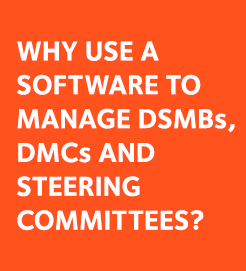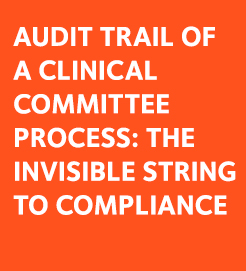Data Safety Monitoring Boards (DSMB) or Data Monitoring Committees (DMC) have become part of the clinical trial routine. This however does not make them simpler or easier to set up and manage. On the contrary, while they play an important role in the trial, these committees add complexity and risk that require careful planning and management. The good news is that new software can take much of the burden off the study team’s plate.
DSMBs and DMCs (the terms are largely interchangeable in clinical research jargon), play a key role in the monitoring of blinded randomized clinical trials (RCT) and the more complex and the longer the trial, the bigger need for independent committees that can review summary data in search of safety signals. The use of a DSMB guarantees that participants will not be exposed to unnecessary risk either by receiving an investigational drug or by taking placebo beyond what is strictly necessary for the documented goals of the particular study. The DSMB will periodically review unblinded data and advise, even impose, to either continue or stop the trial depending on the safety and efficacy so far.
Sometimes efficacy may be better than expected and the trial can be stopped earlier, or worse than expected and there is no justification to continue. On the other hand, safety signals may impose to discontinue the trial.To compose a DSMB you will need to bring together several recognized experts, usually an even number, 3 or 5, with no financial or scientific ties to the sponsor or the drug in development. Internal resources in connection with the DSMB may include, but not limited to, medical experts, clinical specialists, and statisticians. These will face a number of challenges and here are the five more important:
Challenge #1:Compliance with SOPs and other procedures
Compliance being an absolute requirement, it is important to ensure that no deviation will occur due to omissions, handovers, or misunderstandings. Inspectors will not accept excuses and it is so much better to ensure from the start that all standard procedures are embedded in the process rather than making corrections along the way.
Challenge #2: Traceability of all data and all actions
This is also part of the many obligations that will ensure full transparency in case of inspection. It sounds obvious and easy but in practice, ensuring full traceability can prove a real headache unless set up from the very beginning.
Challenge #3: Security
Because the work of a DSMB involves individuals external to the sponsor, physically located outside of the company premises and operating from outside of the company firewall, all electronic communications must be secured to avoid accidental or malignant disclosure of proprietary and blinded information.
Challenge #4: Confidentiality
In addition to physical data safety, because the DSMB has access to unblinded summary study data, it is important to ensure and to guarantee that only the designated individuals have access to this data.
Challenge #5: The infrequent contacts.
Finally, the connection to the board members can prove challenging for a somewhat curious reason. Indeed, DSMBs do not meet more than once or twice a year and having to remember all the rules from one time to the next can prove complex and error prone.
In summary, the above five challenges altogether make it complex and risky to manage a DSMB or DMC. These committees are nevertheless essential to the conduct of the trial and safety of participants.
A strong, reliable tool like eDSMB® allowing to standardize the process, manage meetings and documents authorizations, and document the decisions and follow-up actions can help save time of both the team and committee members and, importantly, support the overall trial quality.
REQUEST A FREE DEMO OF THE eDSMB® SOFTWARE
A cost-effective, compliant software with customized support for your DSMBs and DMCs management.







